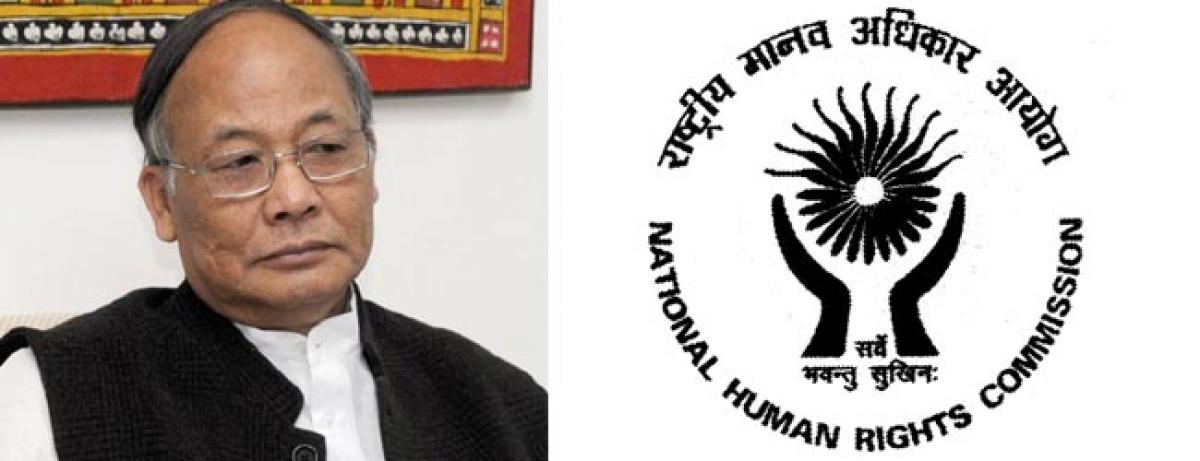Live
- GMR Airports Unveils AI-Powered Digital Twin Platform to Transform Airport Operations
- India poised to become leading maritime player: PM Modi
- Top Causes of Kidney Stones and How to Recognize Silent Symptoms
- India’s renewable energy capacity logs 14.2 pc growth at 213.7 GW
- Winter Session of Odisha Assembly adjourned sine die
- Biden calls Trump's tariff approach 'major mistake'
- After Drama Over Eknath Shinde’s Chief Minister Race, Maharashtra Cabinet Formation Faces New Tensions
- Egyptian FM, Blinken discuss recent developments in Syria
- Iran's supreme leader says Syria's developments result of US-Israeli 'plot'
- Elon Musk to Purchase $100 Million Luxury Mansion Next to Donald Trump's Mar-a-Lago, Report Reveals
Just In

Despite an assurance by Chief Minister Okram Ibobi Singh that a chairman for the Manipur Human Rights Commission (MHRC) would be appointed soon, no such step has been taken by the government.
Imphal: Despite an assurance by Chief Minister Okram Ibobi Singh that a chairman for the Manipur Human Rights Commission (MHRC) would be appointed soon, no such step has been taken by the government.
The commission has been lying defunct since May 2010 with hundreds of complainants having nowhere to go.
The assurance during the budget session that ended on March 4 had raised hopes that the commission would start functioning within a few days. The chief minister had said that preferably a retired high court judge would fill up the position.
Manipur, which has more than 50 armed groups operating in a state with a small population of 2.7 million, has always been a "conflict zone" since the 1970s.
According to an affidavit filed by human rights groups in the Supreme Court, at least 1,528 persons had become victims of the extra judicial executions in the state. The apex court, which had selected six sample cases out of the list, found that there was prima facie evidence to justify investigation.
Human rights activists say there was a glimmer of hope among the people when the state government set up the MHRC in 1998. However, a deputy secretary of the MHRC wrote a letter to the National Human Rights Commission in October 2011 saying that "the MHRC is unable to take up any cases after May 9, 2010".
The government had apparently taken a decision not to send any case relating to the violation of human rights from that date. The matter came to light when the NHRC had forwarded a complaint for comments from the MHRC.
The Asian Centre for Human Rights had filed a complaint with the NHRC on September 16, 2011, regarding alleged torture of Noor Kamal Sheikh. It said that police personnel at the Khudekpi outpost had arrested and tortured the victim on September 5.
Sources said that after the MHRC letter, the national commission and others had stopped forwarding anything to the MHRC, which then became largely defunct.
"There are many victims of excesses who cannot go to court or afford the fees of the lawyers. But they could file their complaint on a plain paper without paying anything to the MHRC," noted human rights activists and lawyer Khaidem Mani told IANS.
He said the Manipur government has not followed the guidelines in the past that the chairman should usually be a retired high court judge and that at least one retired high court or district and sessions court judge and a human rights activist with legal knowledge should be appointed as members.
"If the MHRC is revived it will be of immense help to poor sections of the people who are victims of senseless excesses of the state forces", Mani said.
In the absence of the state commision, people have to approach the high court where the cases keep piling up for months. The Manipur high court had summoned the chief secretary of Manipur, Oinam Nabakishore, about one and a half months back to explain when the commission would be revived.
The chief secretary had sought three months from the high court for the revival.
After the assurance by the chief minister in the Assembly, hopes were raised that a chairman for the commission would be appointed soon after the budget session. But the hopes have now been belied.
In July 2009, there was a stand-off between the MHRC and some police officers relating to the killings of Thokchom Rabina and a former and unarmed insurgent Chungkham Sanjit in Imphal city. R.K. Rajendra, a member of the MHRC, had summoned the then police superintendent and the station house officer to appear before the commission.
The police officers refused to appear saying they were busy with the preparations of the police raising day. Eventually the NHRC had issued an arrest warrant with orders to produce the officers on September 25.
However the police asked the commission to drop the proceedings because a judicial commission had been set up to probe the incident.
Human rights activists say that the confrontation may have been the reason why the MHRC was rendered defunct. The Armed Forces (Special Powers) Act, 1958, has been in force in Manipur since 1980.
By Iboyaima Laithangbam
(The author can be contacted at [email protected])

© 2024 Hyderabad Media House Limited/The Hans India. All rights reserved. Powered by hocalwire.com







